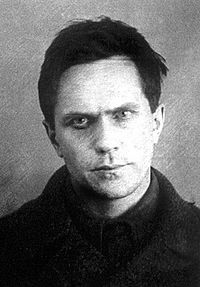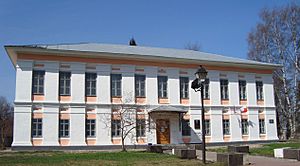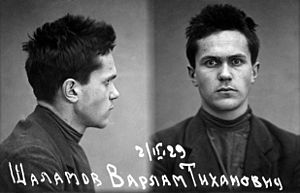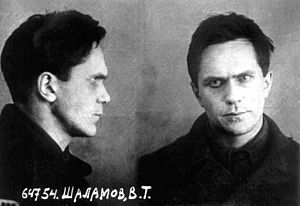Varlam Shalamov facts for kids
Quick facts for kids
Varlam Shalamov
|
|
|---|---|

Shalamov in 1937
|
|
| Born | 18 June 1907 Vologda, Russian Empire |
| Died | 17 January 1982 (aged 74) Tushino city district, Moscow, Russian SFSR, Soviet Union |
| Occupation | Writer, journalist, poet |
| Alma mater | Moscow State University |
| Notable works | Kolyma Tales |
| Signature | |
Varlam Tikhonovich Shalamov (Russian: Варла́м Ти́хонович Шала́мов; 18 June 1907 – 17 January 1982) was a Russian writer, journalist, and poet. He is famous for his powerful stories about surviving the Gulag. The Gulag was a system of harsh forced-labor camps in the Soviet Union.
Shalamov spent many years, from 1937 to 1951, imprisoned in these camps. Most of his time was in the very cold Arctic region of Kolyma. He was arrested partly because he supported Leon Trotsky and praised another writer, Ivan Bunin. In 1946, when he was very sick, he became a medical assistant while still a prisoner. This job helped him survive. He stayed in this role until 1953, two years after he was officially released.
From 1954 to 1978, Shalamov wrote many short stories about his experiences in the labor camps. These stories were collected into six books called Kolyma Tales. They were first published in English in other countries in the 1960s. Later, they came out in Russian. They were finally allowed to be published in the Soviet Union in 1987. The Kolyma Tales is seen as Shalamov's most important work. It is considered the best record of what life was like in the labor camps.
Contents
Early Life
Varlam Shalamov was born in Vologda, a city in Russia. His family was very religious. His father, Tikhon Nikolayevich Shalamov, was a priest and a teacher. Varlam's mother, Nadezhda Aleksandrovna, was also a teacher. She loved poetry, and Varlam thought she could have been a poet herself.
Varlam's father worked as a missionary in Alaska for 12 years. Varlam's older brother, Sergei, grew up there. The family returned to Russia around 1905. In 1914, Varlam started school at a gymnasium and finished in 1923. Even though his father was a priest, Varlam said he became an atheist at age 13. His father had modern views and even supported the October Revolution.
After school, Varlam faced a problem. The local education office would not support his studies because his father was a priest. So, he found a job working with leather at a factory near Moscow. In 1926, after working for two years, he got into Moscow State University. He studied Soviet Law there.
While at university, Varlam was very interested in literature. He loved the works of Alexander Pushkin and Boris Pasternak. These poets influenced him throughout his life. He also admired writers like Fyodor Dostoyevsky and Ernest Hemingway.
First Imprisonment (1929–1932)
Varlam Shalamov joined a group that supported Trotskyism. This was a political idea that disagreed with Joseph Stalin. On February 19, 1929, Shalamov was arrested. He was sent to a prison called Butyrskaya prison.
He was later sentenced to three years of forced labor in a town called Vizhaikha. His "crimes" included sharing a letter by Vladimir Lenin that criticized Stalin. He also took part in a protest against Stalin. Shalamov bravely refused to sign the document that called him a criminal. He was proud to follow in the footsteps of earlier Russian revolutionaries.
He was taken by train to a former monastery that had become a police headquarters. Shalamov was released in 1931. He then worked at a chemical plant construction site. He was offered a chance to move to Kolyma, but he joked that he would only go if forced. Sadly, this joke later came true. He returned to Moscow in 1932. There, he worked as a journalist and had some of his writings published.
Second Imprisonment (1937–1942)
The Great Purge was a time when many people in the Soviet Union were arrested. On January 12, 1937, Shalamov was arrested again. He was accused of "counter-revolutionary Trotskyist activities." This time, he was sent to Kolyma, a place known as "the land of white death," for five years. One of his short stories was published while he was already in jail waiting for his sentence.
Third Imprisonment (1943–1951)
In 1943, Shalamov received another sentence, this time for 10 years. He was charged under Article 58, which was for "anti-Soviet agitation." One reason was that he called Nobel Prize winner Ivan Bunin a "great Russian writer."
Life in the camps was extremely hard. He first worked in gold mines, then in coal mines. He was often sent to punishment areas. This was for his political "crimes" and for trying to escape. He survived a serious illness called typhus during this time. He later wrote that he didn't even care much about surviving back then.
In 1946, Shalamov was very weak and close to death. A doctor who was also a prisoner, A. I. Pantyukhov, saved his life. The doctor risked his own safety to get Shalamov a job as a hospital attendant in the camp. This new job helped Shalamov survive. It also allowed him to focus on writing poetry.
After Release
Shalamov was released from the camp in 1951. He continued to work as a medical assistant for the forced labor camps. He also kept writing. After his release, he found that his family had changed. His grown-up daughter did not want to recognize him.
In 1952, Shalamov sent his poems to the famous writer Boris Pasternak. Pasternak praised his work. Shalamov was allowed to leave Magadan in November 1953, after Stalin died. He was permitted to go to a village near Moscow. There, he worked as a supply agent.
Kolyma Tales
From 1954 to 1973, Shalamov worked on his book of short stories, Kolyma Tales. These stories describe life in the labor camps. During a time called the Khrushchev thaw, many prisoners were released from the Gulag. They were also officially cleared of their past "crimes." Shalamov was allowed to return to Moscow in 1956 after being officially cleared.
In 1957, he became a writer for a literary magazine called Moskva. His poetry started to be published. However, his health was very poor because of his years in the camps. He received a disability pension.
Shalamov continued to publish poems and essays in Soviet magazines. At the same time, he was writing his most important work, Kolyma Tales. He knew other famous writers like Aleksandr Solzhenitsyn and Boris Pasternak. The handwritten copies of Kolyma Tales were secretly sent out of the country. They were also shared secretly within the Soviet Union, a practice called samizdat.
Translations of his stories were published in other countries in 1966. The full Russian version was published in London in 1978. As the scholar David Satter wrote, "Shalamov's short stories are the definitive chronicle of those camps." Kolyma Tales is considered one of the greatest Russian short story collections of the 20th century.
Later in his life, Shalamov had disagreements with Solzhenitsyn and other writers. He did not want his works to be published abroad at that time. Shalamov also wrote stories about his own life. These essays beautifully describe his hometown of Vologda and his life before prison.
Last Years
As Shalamov's health got worse, he spent his last three years in a home for elderly writers. This home was run by the Union of Soviet Writers.
Even with his health problems, he kept writing poems. A friend, A. A. Morozov, wrote them down and helped publish them. After a quick check-up, it was decided he should move to a mental health facility. On the way there, he became sick and got pneumonia.
Varlam Shalamov died on January 17, 1982. Even though he was an atheist, he had an Orthodox funeral ceremony. This was because his friend, Zakharova, insisted on it. He was buried at Kuntsevo Cemetery in Moscow. A historian named Valery Yesipov said that only about 40 people attended Shalamov's funeral.
Kolyma Tales was finally published in Russia in 1987. This happened because of Mikhail Gorbachev's policy of openness, known as glasnost.
Legacy
In 1991, the house where Shalamov's family lived in Vologda became a museum. It is called the Shalamov Memorial Museum. A hill in Vologda is also named in his memory.
One of his Kolyma short stories, "The Final Battle of Major Pugachoff," was made into a film in 2005. In 2007, Russian Television made a TV series called "Lenin's Testament." This series was based on Kolyma Tales.
A minor planet discovered in 1977 is named 3408 Shalamov after him. A monument to Shalamov was put up in Krasnovishersk in June 2007. This was the place of his first labor camp.
A monument on Shalamov's grave was destroyed by vandals in 2001. The case was not fully solved. But with help from some workers, the monument was rebuilt in 2001. Some of Shalamov's poems have also been turned into songs.
See also
 In Spanish: Varlam Shalámov para niños
In Spanish: Varlam Shalámov para niños
- History of the Soviet Union
- Enemy of the people
- 101st km
- Karlo Štajner
- Aleksandr Solzhenitsyn
- Lev Razgon
- Evgenia Ginzburg
 | Delilah Pierce |
 | Gordon Parks |
 | Augusta Savage |
 | Charles Ethan Porter |




